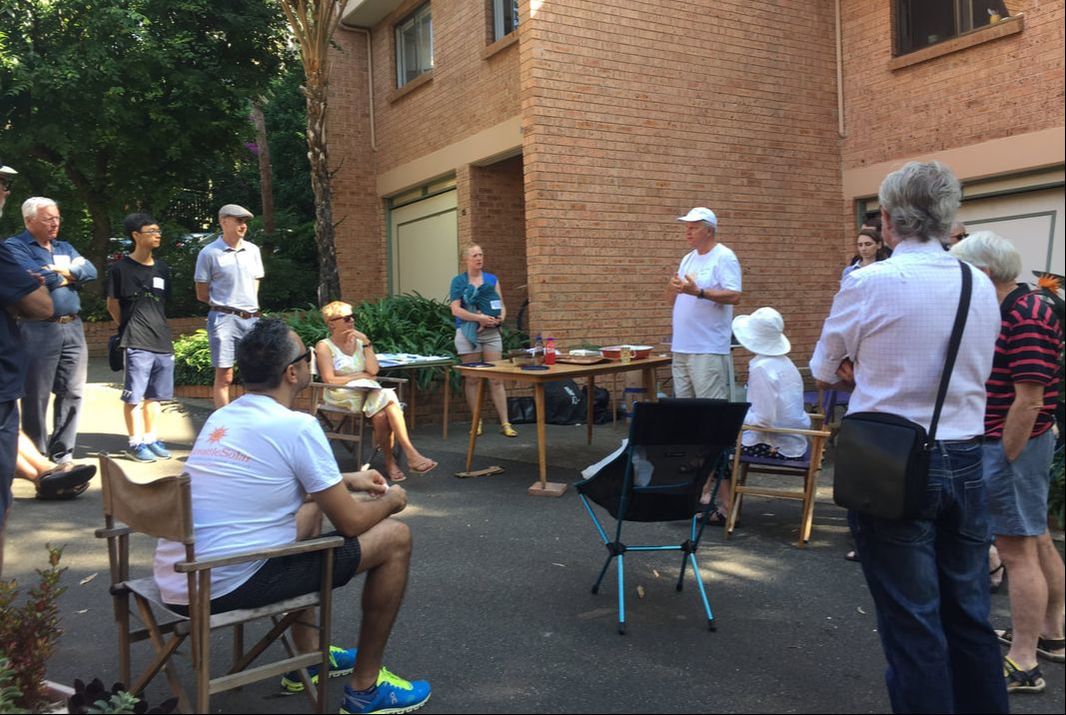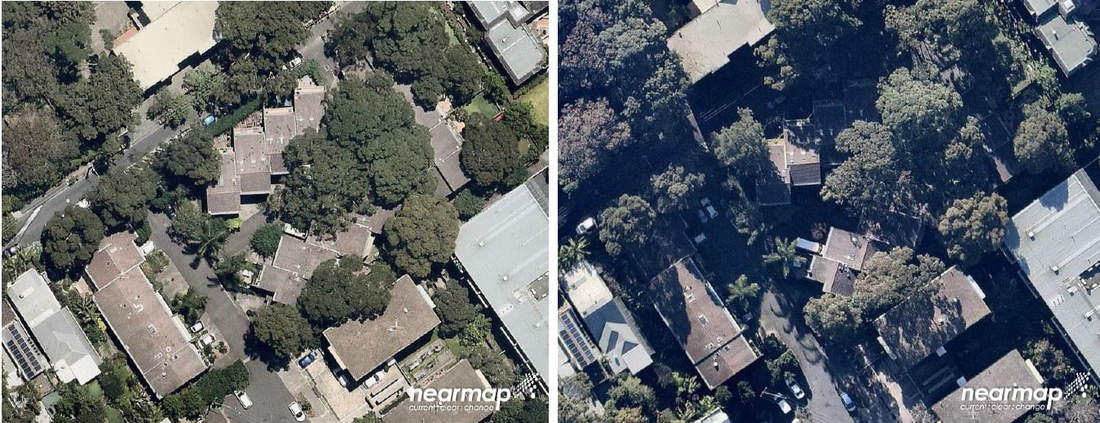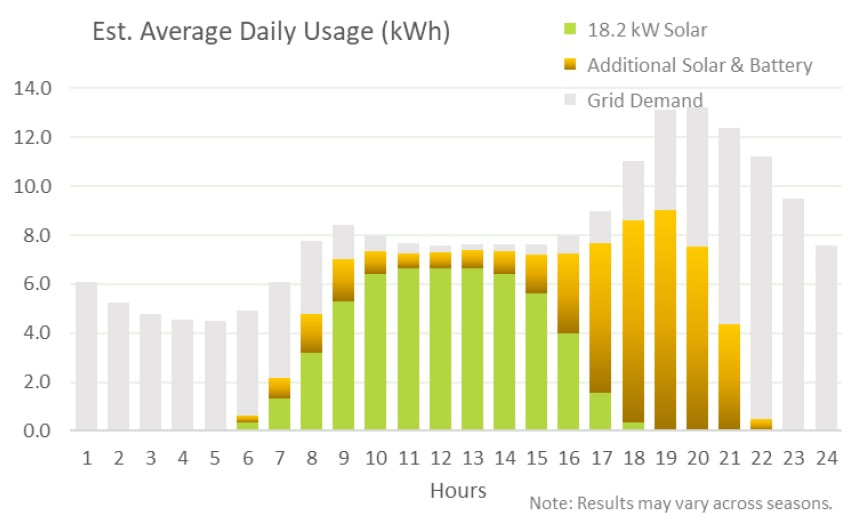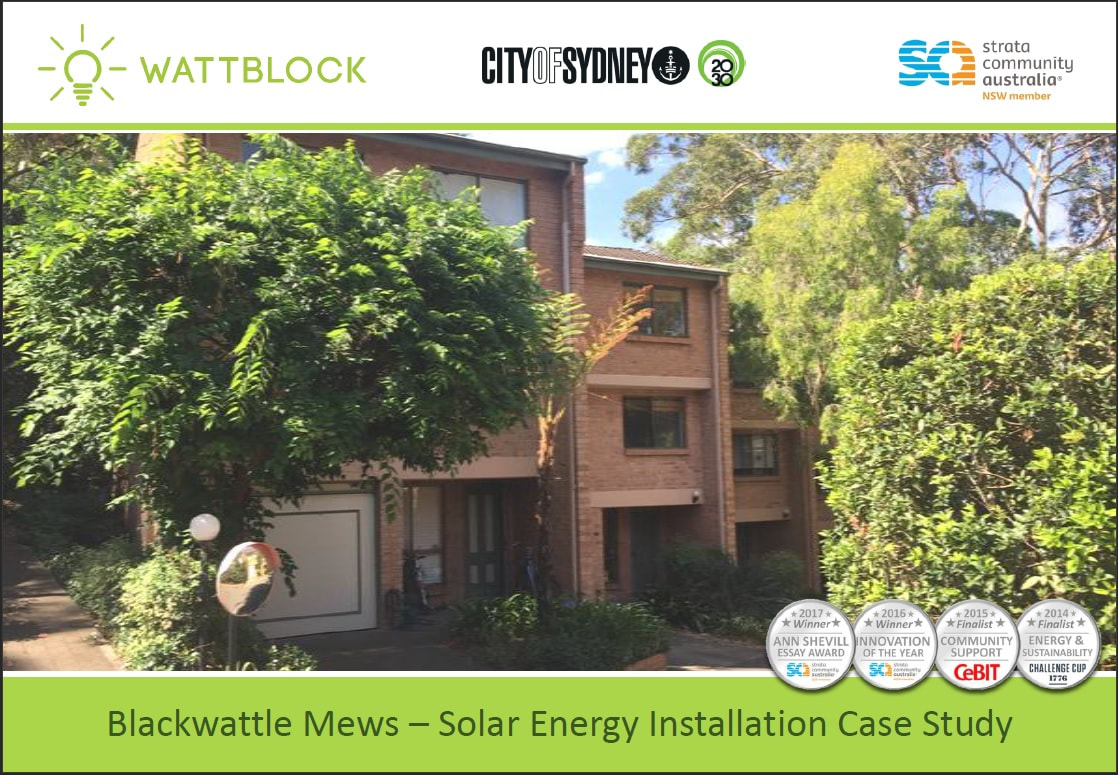|
One small 18 townhouse block in Sydney is showing how the strata industry can lead an energy revolution with shared solar energy, battery storage, electric vehicle charging, microgrids and energy trading.
This is one super switched on Owners Corporation. They have worked hard to refine the solution, engage with the strata community and keep everyone happy. Below, local MP Jamie Parker turned up at their community barbecue Q&A session on Sunday morning. Blackwattle Mews team Alex, Luci, and Neil, consultants Wattblock and Jamie Parker MP The strata committee members of Blackwattle Mews, Alex, Lucian, Neil, Paul and Peter first started the investigation of solar power back in January 2017 due to the rapid fall in solar system costs. Since then, the committee has engaged the sustainability team at the City of Sydney and consultants Wattblock. Plan For Electric Vehicles The City of Sydney separately engaged Wattblock to study the impacts of electric vehicle charging in strata buildings. Blackwattle Mews was able to participate in their national survey about resident attitudes and intentions. This was a huge eye opener. Firstly, Blackwattle Mews had the highest survey response rate (94%) out of the 125 participating strata schemes. Secondly, electric vehicles are definitely coming and they are going to have a huge impact on energy demands in strata. Each new electric vehicle charger is like adding the equivalent of another townhouse, so the original switch board design doesn't cater for that. Because of this fact, the strata committee realised they need to think about the long term impact and a much bigger investment. Shared Community Solar + Batteries Another major factor considered was whether or not townhouses should install individual solar and battery systems or invest in one large shared system. Access to the suns rays is not distributed evenly, so individual systems were deemed to be both unfair and inefficient. The analysis demonstrated that a larger shared system was more efficient as it allows for demand aggregation. In other words, the more people that share the solar energy, the less likely it will be wasted because individuals are not home to use it. Besides performance, the overall cost of the system benefits from economies of scale that heavily favour a larger shared system. Furthermore, like most strata schemes the rooftop is actually common property. The community quickly reached consensus that a large shared system with the best possible solar access was the way to go. However, it had to be done in a equitable way. Aerial View during summer (left) and winter (right) Bulk Energy Supply and Trading As a stand alone investment, an embedded network or 'microgrid' can deliver huge financial benefits through bulk buying energy supply to the collective 18 townhouses. With the addition of solar energy, batteries, and electric vehicle charging this starts to look very interesting. Connecting the solar and battery array to the 'gate meter' will enable Blackwattle Mews to sell any unused solar energy in bulk to energy retailers. Furthermore, all the townhouse residents will benefit from the solar energy generation through a single integrated electricity supply bill. Equitable Distribution of Benefits The best way to get a project like this off the ground is to ensure there is equitable distribution of benefits. Townhouse owners asked the right questions. Is this going to favour retirees who are at home and can use the solar energy over working people? What if I rent out my property, how do I benefit? The proposed solution is that everyone pays the same electricity rates regardless of whether they use more or less solar. The benefits of solar can simply be factored into that average energy rate. However, by charging the residents a 'market competitive' rate, the majority of the benefit could actually be retained within the Owners Corporation. Importantly, this allows for more direct payback on the initial project investment in the short term. In the longer term, the strata community has the flexibility to pass more savings onto residents or retain the collective savings in the OC to offset strata levies for owners. Combined 35kW of good solar access using 53.6 kWh of batteries Financial Assessment From a cash flow perspective, the project is estimated to deliver a payback of between four to eight years, depending on system scale and inclusions. However, with further research on property valuation impacts the committee is expecting to see a 3-10% increase in property values. There was clear evidence that green properties were attracting premium valuations. Electric vehicle charging is also being marketed as a premium feature in new property developments. With these factors considered Blackwattle Mews is convinced it should pursue the larger fully inclusive scope. Environmental Impact While Australia is world leading in its solar energy installations, there is almost zero in the strata market. There are multiple reasons for this. However, for high density cities like the City of Sydney, a solution is needed to meet carbon abatement targets. The Blackwattle Mews case study is expected to serve as a model for future townhouse strata schemes. The study show that such a solution can deliver a 62% reduction to grid energy giving an annual carbon reduction of 47 tonnes. This is 12.5 times the national carbon reduction target. More than anything else, the team at Blackwattle Mews are motivated by impact they can have on the environment. At the BBQ gathering Alex noted that if half the 74,000 strata dwellings in the City of Sydney local government area adopted a minimal sized project, then the savings would be more than 51,000 tonnes of carbon, equivalent to a forest of 771,000 trees or taking more than 10,000 petrol cars off the road. For further reading visit the Blackwattle Mews blog page. You can also download the Blackwattle Mews - Solar Feasibility Case Study [PDF 31 pages]. Related articles by Strata Energy News include Capitalising on Solar Access Rights, Embedded Network Rules and NABERS disrupts Strata Energy Goldrush. You can also read more about the the new regulatory framework for embedded networks effective from 1st March 2018. Ross McIntyre Contributor, Strata Energy News Strata managers can now register buildings in the City of Sydney and in Melbourne for a fully funded electric vehicle recharge assessment. Registrations for Brisbane have closed. However, if you're interested in learning more contact Scott Witheridge on (02) 9977 1801. Read more about the program here.
0 Comments
Your comment will be posted after it is approved.
Leave a Reply. |
Strata Energy NewsReceive our newsletter updates by email. Categories
All
Archives
May 2024
|
Services |
Company |
|






 RSS Feed
RSS Feed